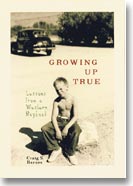 |
||||||||||
 |
||||||||||
 |
||||||||||
 |
||||||||||
|
Search
|
||||||||||
|
Titles |
||||||||||
|
|
||||||||||
|
|
||||||||||||||||||||
|
Written in a compellingly simple style, Growing Up True evokes the struggles of a boy stretching for manhood. Whether describing the dares of taunting schoolmates, his perfectionistic father’s attempts to true a fence by adjusting the posts just a “whisker more,” a prissy aunt caring for a freezing lamb in the family kitchen, or his own coming to terms with a suicide, Craig Barnes offers readers a hopeful message in which integrity, hard work, kindness, and tolerance remain bedrock. |
|
Excerpt “Ditch’s in!” yelled Darryl and we took off running, swinging our lunch buckets around our heads, stumbling to the water’s edge. We slid to a dusty halt in dry soil on top of the brown cliffs above the Big Bend. About fifteen feet below, slow-moving dark water carried all the refuse of winter, everything that had been piling up in the miles and miles of sandy ditch through the long months since the last run of August. The moving current looked as cold as slush and I said quickly, to sort of get my defenses up, “My mother won’t let me swim in this.” “That’s silly,” said Arnie immediately. Arnie specialized in making little kids feel littler. “You ought to. Mothers don’t know much about swimming in the Highline Canal.” I looked at him skeptically. My mother was not so bad. “Mothers used to be girls,” he explained. He chortled wickedly. Arnie was always good at explaining the rules to referees whenever we played football or to younger grades whenever they almost won some playground game he was in. He seemed to know a little more about how rules that we thought were rules were not rules, really. He was in direct contact with some upper world governed by muscle and brawn in which rules were not rules, the same as most little kids thought. “On the first day,” he said, “when the ditch has to be washed out, there is going to be dead sheep. Sure. But to say that a person don’t have no right to swim in the Highline Canal just because once’t there was dead sheep is just dumb.” Arnie was looking off into the distance toward Kansas as if consulting with the source of knowledge for people with big muscles. His own arms were like steel pipes. He milked every morning and night and hayed all summer and was good with his hands. “Beats me about dumb women,” he said. “This first day when the ditch runs there are always logs and boards and pop cans and such, but they don’t never hurt nobody.” He looked at me. “Except maybe city kids.” I was only about a year out of the city. Arnie had touched on a serious character flaw and I knew it. I looked down at the brown water and saw fluffy yellow creamy foam drifting along in big clumps, but I did not see any dead sheep. Arnie said, “There are not very many dead anythings, really, practically at all.” |
||||
|
Review Here’s a rarity: a memorable memoir in which the author transforms ordinary lives into the extraordinary by sensitivity, honesty, and great writing skill. Beyond all else it is a reminder of the beauty and terror that is the daily struggle of youth-innocence desperate to learn the truth. One senses that this book is the result of a promise made by the author to his family to set down what was. Craig Barnes has done so bravely and wonderfully. What is written here is a true love story, the love of family. Bravo! —Avi Craig Barnes has crafted a beautiful, evocative book. This vivid reminiscence of family life in the rural West explains--better than any general work I have read--the beliefs and values and personal strengths that enabled the so-called "greatest generation" to surmount the challenges presented by the Great Depression and the world's first global war. As a story of family life in America, GROWING UP TRUE is a boyhood classic which belongs on the special shelf that holds Russell Baker's book about GROWING UP in Baltimore. —Stewart Udall |
||||
|
Fulcrum Publishing – 16100 Table Mountain Parkway, Suite 300 – Golden, Colorado 80403
|
||||
